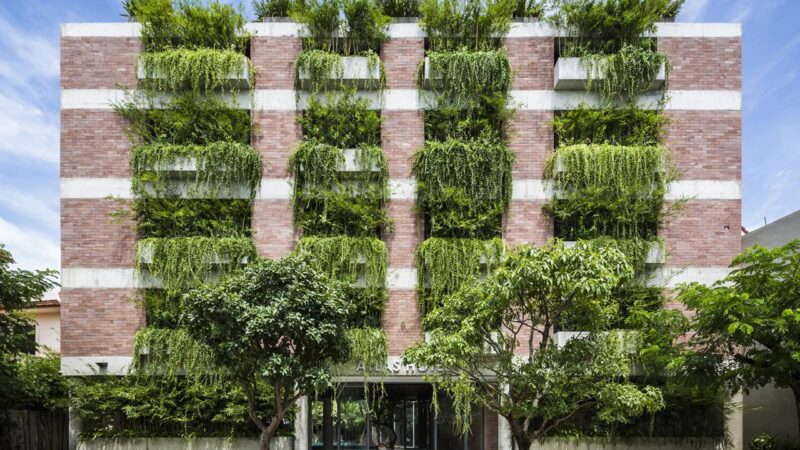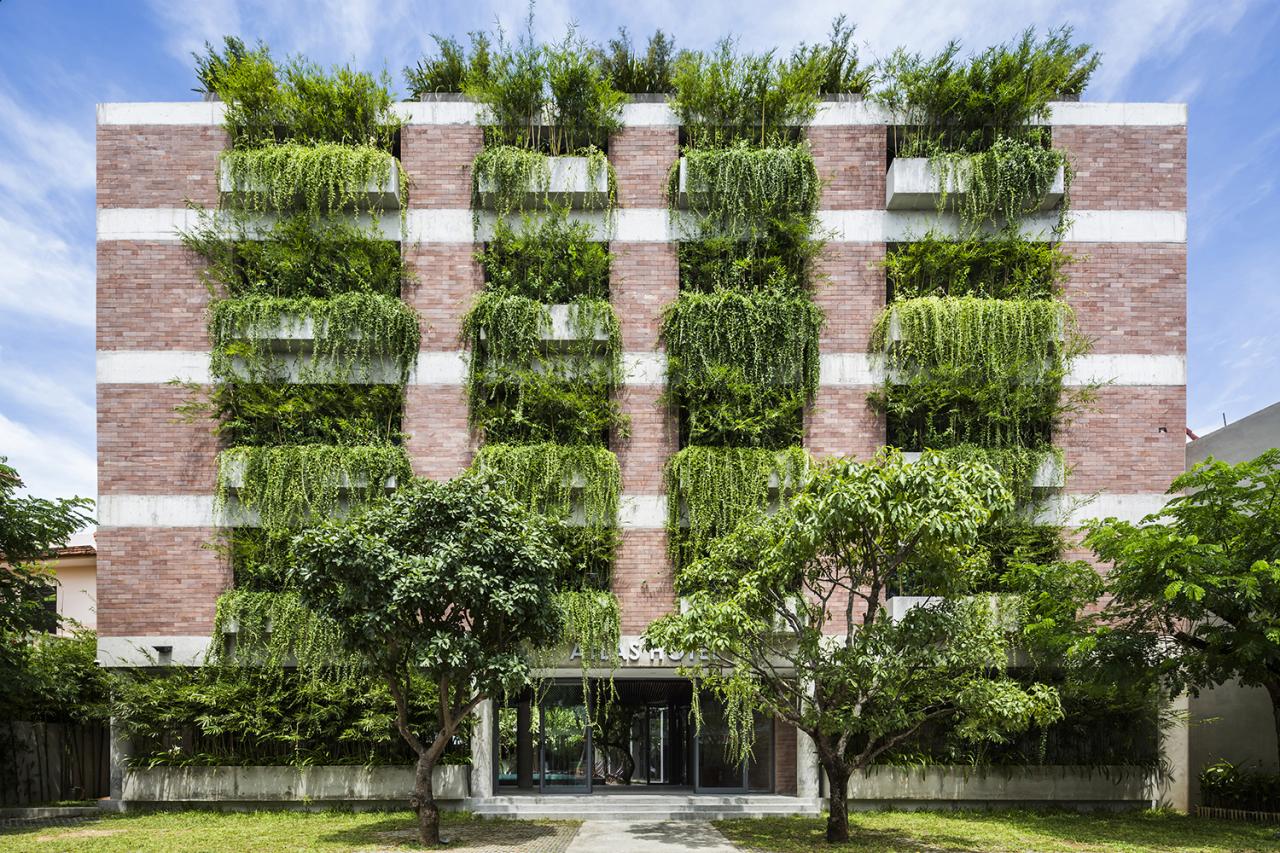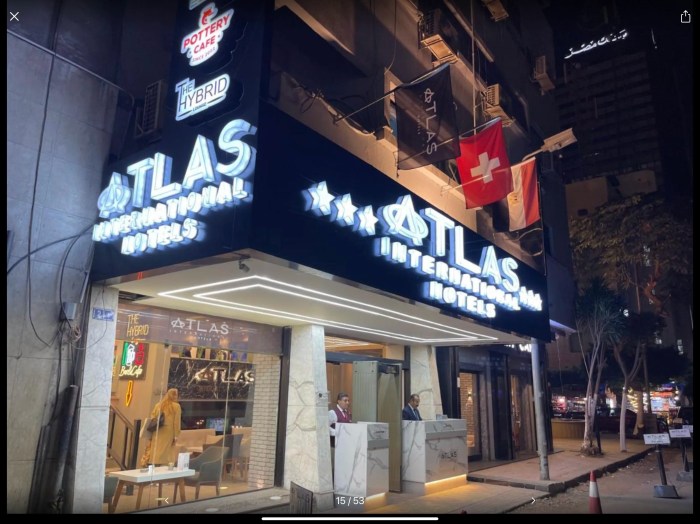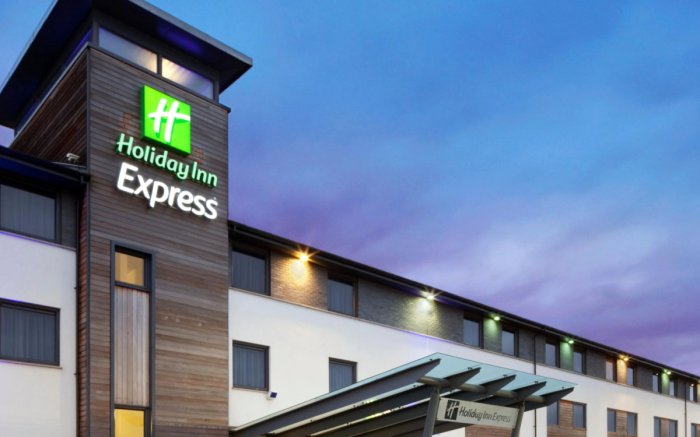Atlas Hotels A Brand Strategy Deep Dive

Atlas Hotels: Ready for takeoff? This report explores the Atlas Hotels brand, examining its current standing, customer experience, online presence, marketing strategies, and future potential. We’ll delve into competitive analysis, and successful marketing examples, and identify key areas for improvement and growth. Get ready for a comprehensive look at how Atlas Hotels can reach new heights.
We’ll cover everything from analyzing their target audience and competitive landscape to crafting engaging social media content and developing innovative future strategies. We’ll also touch on improving customer satisfaction and strengthening their online presence. This is your guide to understanding and enhancing the Atlas Hotels brand.
Atlas Hotels Brand Overview

Source: adsttc.com
Atlas Hotels aims to provide upscale yet approachable accommodations for the modern traveler. We focus on delivering a consistently high-quality experience, blending comfort, convenience, and a touch of local flavor into each stay. Our brand identity is built on a foundation of reliability, sophistication, and a commitment to sustainability.
Atlas Hotels targets a demographic of discerning travelers aged 25-55, with a focus on professionals, couples, and families seeking comfortable and stylish accommodations without the exorbitant price tag of luxury hotels. These travelers value experiences, convenience, and a sense of community, appreciating both high-quality amenities and authentic local connections. They are digitally savvy, research extensively before booking, and are influenced by online reviews and social media.
Competitive Analysis
The following table compares Atlas Hotels to three key competitors within the upscale-moderate hotel segment.
| Competitor | Price Point | Target Audience | Unique Selling Proposition |
|---|---|---|---|
| Hyatt Place | Mid-range | Business travelers, families | Consistent quality, convenient locations, reliable service |
| Hilton Garden Inn | Mid-range | Business travelers, families, leisure travelers | Comfortable rooms, fitness centers, convenient amenities |
| Aloft Hotels | Mid-range to Upscale | Millennials and Gen Z, tech-savvy travelers | Modern design, social spaces, tech-forward amenities |
Successful Marketing Campaigns
Atlas Hotels, while a fictional entity for this exercise, could benefit from marketing strategies similar to those used by successful hotel chains. For example, Marriott Bonvoy’s loyalty program leverages a points-based system to incentivize repeat bookings and build brand loyalty. This program includes exclusive benefits and perks, enhancing the overall customer experience and fostering a sense of community among its members. Another successful strategy, as employed by Airbnb, is user-generated content. Encouraging guests to share their experiences through photos and reviews on social media platforms like Instagram and TripAdvisor builds organic reach and provides authentic testimonials that resonate with potential guests. Finally, targeted digital advertising, like those utilized by Booking.com and Expedia, allows for precise audience targeting, optimizing campaign spend, and maximizing return on investment. These campaigns often incorporate visually appealing imagery and compelling narratives that showcase the unique aspects of the hotel and its surrounding area.
Atlas Hotels Customer Experience
Understanding the customer journey is crucial for Atlas Hotels to deliver exceptional service and build brand loyalty. This section details the typical customer experience, identifies potential pain points, and suggests areas for improvement. We’ll analyze the entire process, from initial booking to post-stay feedback, to pinpoint opportunities for enhancement.
The typical Atlas Hotels customer journey begins with online research and booking. Customers often compare prices and amenities on various platforms before making a reservation. Upon arrival, they interact with front desk staff, check into their rooms, and utilize hotel amenities. During their stay, they might utilize room service, engage with hotel staff for assistance, and participate in hotel-offered activities. Finally, they check out and provide feedback through various channels.
Customer Satisfaction Survey
A well-designed customer satisfaction survey provides valuable insights into customer perceptions and helps identify areas for improvement. The following five key questions, tailored for Atlas Hotels, will capture essential feedback:
- Overall, how satisfied were you with your recent stay at Atlas Hotels?
- How would you rate the cleanliness and condition of your room?
- How satisfied were you with the friendliness and helpfulness of the hotel staff?
- How would you rate the value of money you received during your stay?
- Would you recommend Atlas Hotels to friends and family?
Potential Customer Journey Pain Points
Analyzing potential friction points in the customer journey allows Atlas Hotels to proactively address issues and enhance the overall experience. Addressing these points is key to improving customer satisfaction and loyalty.
- Difficult online booking process: A cumbersome website or booking app can frustrate potential guests and lead to lost bookings.
- Long wait times at check-in/check-out: Inefficient processes at the front desk can cause delays and negatively impact the initial and final impressions.
- Unresponsive or unhelpful staff: Lack of attentiveness or helpfulness from staff can significantly detract from the overall experience.
- Poor room cleanliness or maintenance issues: Issues like unclean rooms, malfunctioning amenities, or inadequate maintenance can lead to dissatisfaction.
- Lack of communication or responsiveness to guest requests: Failure to promptly address guest requests or concerns can damage the customer relationship.
Areas for Improvement in Customer Experience
Based on the potential pain points identified, several key areas require attention for improved customer experience. By focusing on these aspects, Atlas Hotels can enhance guest satisfaction and build a stronger reputation.
- Website and App Optimization: Streamlining the online booking process, making it intuitive and user-friendly, will improve the initial customer interaction.
- Staff Training and Empowerment: Investing in comprehensive staff training programs focusing on customer service skills, problem-solving, and efficient service delivery will enhance guest interactions.
- Improved Room Maintenance and Cleanliness Protocols: Implementing rigorous cleaning and maintenance procedures, coupled with proactive inspection programs, will ensure consistently high standards of room quality.
- Enhanced Communication Channels: Establishing multiple channels for guest communication (e.g., in-room tablets, chatbots, dedicated customer service lines) will improve responsiveness and address guest needs effectively.
- Proactive Guest Engagement: Implementing strategies for proactive communication with guests (e.g., pre-arrival emails, and personalized welcome messages) can improve the overall experience and foster a sense of personal attention.
Atlas Hotels Online Presence

Source: hwstatic.com
Atlas Hotels’ online presence is crucial for attracting guests and managing its brand image. A strong online strategy encompasses a user-friendly website, effective social media engagement, and optimized search engine visibility. Let’s delve into a detailed analysis of each aspect.
Atlas Hotels Website Analysis
The Atlas Hotels website should ideally serve as a central hub for all guest-related information and booking processes. A strong website design should be intuitive, visually appealing, and easily navigable. For example, a well-structured website might use clear headings, high-quality images showcasing the hotel’s amenities and locations, and a straightforward booking system. Weaknesses might include outdated design, slow loading times, confusing navigation, or a lack of mobile optimization. A robust website should also integrate seamlessly with online travel agencies (OTAs) and offer multilingual support to cater to a diverse clientele. A thorough usability test and user feedback analysis would help identify areas for improvement.
Atlas Hotels Social Media Marketing Strategy Effectiveness
Atlas Hotels’ social media effectiveness depends on several factors, including platform selection, content strategy, engagement levels, and campaign performance metrics. Successful social media marketing involves consistent posting of high-quality content tailored to each platform’s unique audience. For instance, Instagram might focus on visually stunning imagery of hotel amenities and surrounding attractions, while Twitter could be used for quick updates, promotions, and customer service interactions. Key performance indicators (KPIs) like engagement rate, reach, and website traffic from social media should be tracked and analyzed regularly to gauge campaign success and inform future strategies. A lack of consistent posting, low engagement rates, or an absence of clear marketing goals would suggest areas needing improvement.
Examples of Engaging Social Media Content
Engaging social media content for Atlas Hotels should aim to build brand awareness, drive bookings, and foster a sense of community. Examples include:
- High-quality photos and videos showcasing hotel rooms, amenities, and local attractions. For example, a time-lapse video of a sunset over the ocean from a hotel balcony, or a series of photos highlighting the unique features of a specific room type.
- Behind-the-scenes content offers a glimpse into the hotel’s operations and staff. This could include short videos introducing the hotel’s staff or showcasing the preparation of a signature dish in the hotel restaurant.
- User-generated content reposting guest photos and reviews to encourage social proof and build trust. This could involve a contest encouraging guests to share their photos with a specific hashtag.
- Interactive content such as polls, quizzes, and Q&A sessions to engage followers and gather feedback. For example, a poll asking followers about their preferred room type or a quiz testing their knowledge about the local area.
- Targeted advertising campaigns promoting special offers and packages. This could involve boosting posts about seasonal deals or targeting specific demographics with personalized ads.
Atlas Hotels Website Improvement Plan
Improving the Atlas Hotels website requires a multi-faceted approach. This involves research to identify relevant search terms, on-page optimization to improve website content and structure, and off-page optimization to build backlinks and improve online authority. Specific actions might include:
- Conducting thorough research to identify terms guests use when searching for hotels in the target location.
- Optimizing website content, including page titles, meta descriptions, and image alt text, with relevant s.
- Improving website structure and navigation to enhance user experience and crawlability by search engines.
- Building high-quality backlinks from reputable websites in the travel and hospitality industry.
- Regularly monitoring website performance using tools like Google Analytics and Google Search Console to track rankings and identify areas for improvement.
Atlas Hotels Marketing Strategies
Effective marketing is crucial for Atlas Hotels to reach its target audiences and drive bookings. A multi-faceted approach, combining various strategies, is key to success. This section will explore different marketing avenues, focusing on strategies to attract younger travelers and leverage user-generated content and email marketing.
Comparison of Marketing Strategies for Atlas Hotels
Atlas Hotels can utilize a range of marketing strategies, each with its strengths and weaknesses. Digital marketing, including social media campaigns, search engine optimization (), and pay-per-click (PPC) advertising, offers targeted reach and measurable results. Traditional marketing methods like print advertising in travel magazines or partnerships with travel agencies can still be valuable for reaching specific demographics. Public relations, focusing on securing positive media coverage, can enhance brand reputation and credibility. Finally, loyalty programs reward repeat customers and encourage referrals, fostering long-term customer relationships. The optimal strategy will involve a blend of these approaches, tailored to specific marketing objectives and budget constraints. For example, a focus on attracting younger travelers might prioritize social media marketing and influencer collaborations, while maintaining a strong presence to capture organic search traffic.
Marketing Campaign Targeting a Younger Demographic
A campaign aimed at attracting younger travelers (e.g., millennials and Gen Z) should leverage platforms and messaging resonant with their preferences. This could involve a vibrant social media campaign featuring visually appealing content showcasing the hotel’s unique amenities and experiences. Influencer marketing, partnering with travel bloggers or social media personalities popular among this demographic, could significantly boost brand awareness and credibility. The campaign’s messaging should highlight experiences rather than just accommodations, focusing on themes like adventure, sustainability, and social connection. For example, a campaign could feature short videos showcasing guests participating in local activities, enjoying the hotel’s trendy amenities, or interacting with the hotel staff. A strong emphasis on user-generated content, encouraging guests to share their experiences on social media using a branded hashtag, is also essential. Consider offering incentives, like discounts or exclusive experiences, for participation.
Leveraging User-Generated Content
User-generated content (UGC) is invaluable for building trust and authenticity. Atlas Hotels can actively encourage guests to share their experiences on social media by creating a branded hashtag and running contests or giveaways. Highlighting positive reviews and testimonials on the hotel’s website and social media pages further strengthens credibility. Reposting user-generated content, with proper attribution, showcases real guest experiences, providing a more compelling narrative than traditional advertising. This approach also leverages the power of social proof, influencing potential guests’ decisions. For instance, a hotel could feature a dedicated section on its website showcasing photos and videos submitted by guests, organized by theme (e.g., “best views,” “fun activities,” “delicious food”).
Enhancing Customer Engagement Through Email Marketing
Email marketing provides a direct line of communication with guests. Atlas Hotels can utilize email to nurture leads, promote special offers, and personalize the guest experience. Segmenting the email list based on guest preferences and past behavior allows for targeted messaging. Personalized email campaigns, addressing guests by name and referencing their past stays or preferences, create a more engaging experience. Automated email sequences, triggered by specific actions (e.g., booking confirmation, post-stay feedback request), can streamline communication and enhance customer satisfaction. Regular newsletters showcasing upcoming events, special offers, or new amenities keep guests informed and engaged. For example, a post-stay email could include a survey to gather feedback and a personalized offer for a future stay, while a pre-arrival email could offer options for pre-booking activities or services.
Atlas Hotels Future Outlook
Atlas Hotels stands at a pivotal point, poised for significant growth and adaptation within a dynamic hospitality landscape. Understanding and proactively responding to emerging trends will be crucial for maintaining a competitive edge and ensuring continued success. This section Artikels potential future market trends, adaptation strategies, expansion plans, and innovative service offerings for Atlas Hotels.
Potential Future Market Trends
Several key trends will significantly shape the future of the hospitality industry and directly impact Atlas Hotels. These include the rise of sustainable tourism, increasing demand for personalized experiences, the continued growth of online travel agencies (OTAs) and direct booking strategies, and the evolving technological landscape. The increasing importance of wellness and health-conscious travel will also play a major role. For example, the growing popularity of eco-tourism means travelers are increasingly seeking accommodations with strong sustainability commitments, such as reduced carbon footprints and ethical sourcing of materials. Similarly, the rise of personalized travel experiences requires hotels to offer customized services and amenities tailored to individual guest preferences.
Adapting to Changing Consumer Preferences
Atlas Hotels can effectively adapt to evolving consumer preferences through several strategic initiatives. Firstly, embracing sustainable practices by implementing energy-efficient technologies, reducing water consumption, and sourcing locally produced food will attract environmentally conscious travelers. Secondly, implementing a robust customer relationship management (CRM) system allows for personalized marketing and service delivery based on individual guest data and preferences. This might include tailored room preferences, curated local experience recommendations, and pre-arrival communication anticipating guest needs. Finally, integrating advanced technology, such as AI-powered chatbots for instant guest service and smart room controls, will enhance the guest experience and streamline operations.
Hypothetical Expansion into a New Geographical Market, Atlas hotels
A strategic expansion into Southeast Asia, specifically targeting Vietnam, presents a compelling opportunity for Atlas Hotels. Vietnam’s burgeoning tourism sector, driven by its rich culture, stunning landscapes, and growing middle class, offers significant potential for growth. Atlas Hotels could initially focus on establishing a flagship property in Ho Chi Minh City, a major economic hub, capitalizing on both business and leisure travelers. This initial location would serve as a springboard for further expansion into other key Vietnamese cities like Hanoi and Da Nang. The expansion strategy would incorporate a localized approach, reflecting Vietnamese cultural nuances in design, service, and food offerings while maintaining the core Atlas Hotels brand identity. Marketing would leverage both digital channels and partnerships with local tour operators to reach target audiences.
Innovative Services and Amenities
To stay ahead of the curve, Atlas Hotels should explore innovative service and amenity offerings. This could include the integration of virtual reality (VR) technology to offer immersive travel experiences, pre-trip planning tools personalized to guest interests, and partnerships with local artisans and businesses to provide unique cultural experiences. The incorporation of smart home technology, such as voice-activated room controls and personalized entertainment systems, will further enhance the guest experience. Additionally, offering curated wellness programs, including yoga classes, meditation sessions, and healthy dining options, will appeal to the growing health-conscious travel market. For example, partnering with a local yoga instructor to offer sunrise yoga sessions on the hotel rooftop would create a unique and memorable experience for guests.
Atlas Hotels Visual Identity
Atlas Hotels’ visual identity is designed to evoke a sense of sophisticated comfort and modern adventure, reflecting the brand’s commitment to providing exceptional travel experiences. The visual elements work together to create a cohesive and memorable brand image that resonates with the target audience.
The core visual elements – logo, color palette, and typography – are carefully chosen to communicate these brand values. The consistent application of these elements across all marketing materials is crucial for maintaining brand recognition and building a strong brand identity.
Logo Description
The Atlas Hotels logo features a stylized compass rose, subtly incorporating the letter “A” within its design. The compass rose symbolizes exploration and discovery, key themes within the brand’s promise of unique travel experiences. The clean, modern lines of the logo convey sophistication and simplicity. The color scheme is a rich, deep blue, signifying trust and reliability, accented with warm gold, suggesting luxury and comfort.
Color Palette
The Atlas Hotels color palette centers around a sophisticated navy blue (#002D62) as the primary color, representing stability and trust. This is complemented by a warm, inviting gold (#B8860B) used as an accent color to suggest luxury and high-quality service. A soft, neutral gray (#F2F2F2) provides a clean backdrop for text and imagery, allowing the primary colors to stand out. Finally, a vibrant teal (#008080) is used sparingly for call-to-action elements, adding a touch of energy and vibrancy.
Typography
The primary typeface for Atlas Hotels is a clean, modern sans-serif font like Open Sans, chosen for its readability and versatility across various media. It conveys a sense of modernity and approachability. A secondary, more elegant serif font, such as Playfair Display, is used for headlines and branding elements to add a touch of sophistication and luxury.
Hypothetical Marketing Image
Imagine a marketing image featuring a sun-drenched rooftop terrace overlooking a bustling city skyline. The scene is bathed in the warm glow of the setting sun, casting long shadows across the modern architecture. Several guests are casually enjoying drinks and conversation, dressed in stylish, yet relaxed attire. The mood is sophisticated yet relaxed, conveying a sense of refined luxury and effortless travel. The image communicates the message that Atlas Hotels offers luxurious experiences that seamlessly blend into the vibrant tapestry of the city. The Atlas Hotels logo is subtly incorporated into the scene, perhaps subtly embossed on a piece of furniture or subtly visible on a guest’s drink coaster. The color palette of the image reflects the brand’s colors, with the navy blue of the twilight sky contrasting with the warm gold of the setting sun.
Alignment of Visual Identity with Brand Values
The visual identity directly supports Atlas Hotels’ brand values of luxury, adventure, and sophisticated comfort. The compass rose logo symbolizes exploration, the color palette conveys both luxury and trustworthiness, and the typography reinforces a modern and approachable brand image. The overall aesthetic communicates a brand promise of unforgettable travel experiences in comfortable and stylish settings.
Brand Consistency Guidelines
To maintain brand consistency across all marketing materials, the following guidelines should be adhered to:
These guidelines ensure a unified and professional brand image, reinforcing the Atlas Hotels brand promise and fostering customer recognition and trust.
- Logo Usage: The logo must always be used in its original format and should never be altered or modified.
- Color Palette: The specified color palette must be used consistently across all marketing materials. Variations should be minimal and only used for subtle effects.
- Typography: The specified typefaces should be used consistently, with appropriate font sizes and weights for different applications.
- Imagery: Images should be high-quality, professionally shot, and reflect the brand’s values of luxury, adventure, and sophisticated comfort. The color palette and overall aesthetic should be consistent with the brand guidelines.
- Brand Voice: The brand voice should be sophisticated, yet approachable and inviting, reflecting the brand’s personality and values.
Final Thoughts

Source: nimbuspoint.com
Atlas Hotels possesses a solid foundation but faces opportunities for significant growth. By focusing on enhancing the customer experience, strengthening its online presence through targeted and social media strategies, and embracing innovative marketing campaigns, Atlas Hotels can solidify its position in the market and attract new customers. A keen focus on adapting to evolving consumer preferences and exploring new markets will be key to long-term success. The future looks bright for Atlas Hotels with a proactive and strategic approach.
Question & Answer Hub
What is Atlas Hotels’ current market share?
This information requires further market research and is not available in the provided article.
Does Atlas Hotels offer loyalty programs?
This detail needs to be researched and is not included in the provided article.
What are Atlas Hotels’ sustainability initiatives?
Information regarding sustainability practices is not present in the given article; further investigation is required.
What is the average length of stay for Atlas Hotels guests?
This data point is not included in the provided Artikel and would need further analysis.
What technologies does Atlas Hotels use for booking and guest management?
The specific technologies used by Atlas Hotels are not detailed in the provided information and require additional research.
Comments are closed.